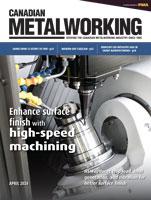President
- FMA
- The Fabricator
- FABTECH
- Canadian Metalworking
Industry associations help manufacturers lay the groundwork for success
Collaboration leads to innovation
- By Jeanine Lassaline-Berglund
- October 1, 2021
COVID-19 has ruled our thoughts and plans for the better part of two years.
As disruptive as it has been, it has caused us to look at life, work, people, and ourselves with a critical eye and re-evaluate our priorities and expectations. This is true amongst advanced manufacturing professionals, especially in small and medium-sized manufacturing facilities.
However, instead of seeing the disruption as a nuisance, it may help our industry to move beyond the immediate by looking toward our future. The effects of COVID-19 have only further amplified the need for immediate action.
Throughout its history, advanced manufacturing has learned some indelible lessons in innovation and resilience, including the ability to pivot on a dime. These are the types of stories and lessons that we want to share to help the industry move forward while keeping the passion for excellence and a shared interest in doing things a little bit differently and expanding what we know and have already learned.
Becoming the new president for both the Canadian Association of Moldmakers (CAMM) and Automate Canada in the middle of what is arguably the biggest global interruption of our lifetime was no small challenge.
The strategic vision for the future of advanced manufacturing and the member companies represented by these associations is rooted in laying groundwork for the sustainability of industry through representation, advocacy, and programming in three strategic pillars of activity. Our goal is to help by understanding the challenges our industry faces and then finding resolutions.
Pillar 1: Skills and Talent Development
- We are developing better ways to connect those looking for careers with those who need trained staff.
- We are exploring transitional skills from other sectors and looking at how to find relevance in the advanced manufacturing sector.
- The need to continue to support education and programming to elevate opportunities in manufacturing and trades is not new. Now, however, we must step up to demand more.
Pillar 2: Technology Adoption and a Culture of Innovation
- Industry 4.0, the fourth industrial revolution, has begun. Digital technology is transforming the industrial and manufacturing world in profound ways. Canadian companies are uniquely positioned to seize the opportunities created by this revolution—yet they must move quickly, or risk being left behind for good.
- We are at the forefront, supporting small and medium-sized advanced manufacturing companies to more easily make the transition to Industry 4.0 practices. Placing the highest priority on digital transformation will aid in the recovery of our economy and put to use the best that human resources have to offer.
Pillar 3: Branding and Collaboration
- This work is key to affecting the industry faster and without having to design or re-invent something that already exists.
- Collaborative marketing options create many possibilities for our initiatives to thrive.
- We know regardless of the tools that exist, it will always be important to develop and foster relationships with industry and other stakeholders to carry our intentions forward.
Advocacy for our members is job No. 1, but we can't do it alone.
It’s time for you to join us; step up and take action to make manufacturing more visible and more powerful.
Jeanine Lassaline-Berglund is president of the Canadian Association of Moldmakers and Automate Canada, www.canadianassociationofmoldmakers.com, www.automatecanada.ca.
subscribe now


Keep up to date with the latest news, events, and technology for all things metal from our pair of monthly magazines written specifically for Canadian manufacturers!
Start Your Free SubscriptionAbout the Author
Jeanine Lassaline-Berglund
Canadian Association of Moldmakers and Automate Canada
- Trending Articles
Automating additive manufacturing

CTMA launches another round of Career-Ready program

Collet chuck provides accuracy in small diameter cutting

Sandvik Coromant hosts workforce development event empowering young women in manufacturing

GF Machining Solutions names managing director and head of market region North and Central Americas

- Industry Events
MME Winnipeg
- April 30, 2024
- Winnipeg, ON Canada
CTMA Economic Uncertainty: Helping You Navigate Windsor Seminar
- April 30, 2024
- Windsor, ON Canada
CTMA Economic Uncertainty: Helping You Navigate Kitchener Seminar
- May 2, 2024
- Kitchener, ON Canada
Automate 2024
- May 6 - 9, 2024
- Chicago, IL
ANCA Open House
- May 7 - 8, 2024
- Wixom, MI
















